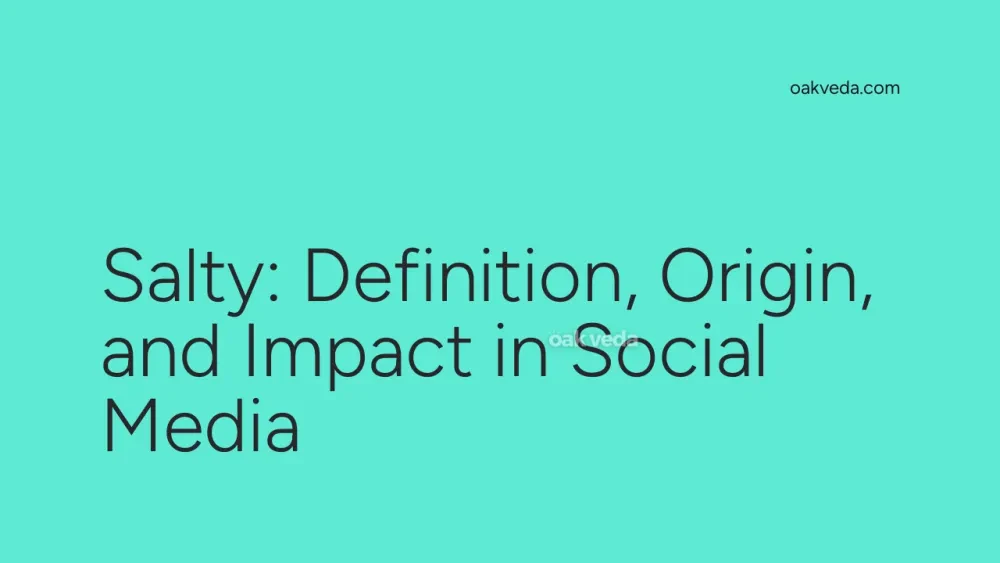
What is "Salty"?
In the realm of social media and online communication, "salty" has emerged as a popular slang term describing a person's negative emotional state or attitude. When someone is labeled as salty, it typically means they're exhibiting signs of bitterness, resentment, or irritation, often in response to criticism, defeat, or perceived slights.
Origin and Development of "Salty"
The term "salty" has its roots in nautical slang, where old sailors were described as "salty" due to their gruff, irritable demeanor after long periods at sea. Over time, this usage evolved and found its way into mainstream vernacular, particularly in sports contexts to describe players who were visibly upset after a loss.
With the rise of social media and online gaming communities, "salty" gained significant traction in the digital landscape. It became a quick, catchy way to describe users who displayed poor sportsmanship or reacted negatively to online interactions.
How "Salty" Works in Social Media
On social media platforms, "salty" is often used in the following ways:
- Comments: Users might label someone as salty if they leave angry or bitter comments on posts.
- Reactions: Excessive use of certain emojis or reaction buttons can be interpreted as salty behavior.
- Posts: Individuals might create entire posts venting their frustrations, which others may describe as salty.
- Memes: "Salty" has inspired numerous memes and image macros depicting exaggerated reactions.
Types or Variations of "Salty"
While "salty" is the primary term, there are variations and related expressions:
- Salt: Used as a noun, e.g., "There's a lot of salt in this thread."
- Saltiness: The state of being salty, e.g., "The saltiness is real."
- Salt mine: A place or situation where many people are salty, often used in gaming contexts.
Popular Examples of "Salty" Behavior
- Gaming: A player trash-talking after losing a match.
- Social media debates: Users leaving heated comments on controversial topics.
- Celebrity interactions: Fans reacting negatively to perceived slights from their idols.
- Sports discussions: Supporters expressing bitterness about their team's performance or referee decisions.
Impact of "Salty" on Social Media Culture
The concept of "salty" has significantly influenced online interactions:
- Communication shorthand: It provides a quick way to describe complex emotional states.
- Conflict identification: Helps users recognize and sometimes defuse tense situations.
- Self-awareness: Encourages individuals to reflect on their own reactions.
- Humor: Often used in a lighthearted manner to diffuse tension or create relatable content.
Controversies or Debates Surrounding "Salty"
While "salty" is widely used, it's not without its critics:
- Dismissiveness: Some argue that labeling someone as salty trivializes genuine concerns or emotions.
- Overuse: Like many internet terms, there's a risk of the word losing its impact through excessive use.
- Misinterpretation: Text-based communication can lead to misunderstandings about whether someone is truly "salty" or just expressing a valid opinion.
How Brands and Influencers Use "Salty"
Savvy brands and influencers have incorporated "salty" into their social media strategies:
- Engagement: Using the term to relate to their audience and appear current.
- Content creation: Developing "salty" themed posts or campaigns to spark interaction.
- Customer service: Addressing "salty" customers with humor to diffuse situations.
- Product marketing: Some brands, particularly in the snack industry, play on the dual meaning of "salty."
Future Trends Related to "Salty"
As social media evolves, so too will the use of "salty":
- Evolving meaning: The term may shift or expand its definition over time.
- AI recognition: Future sentiment analysis tools might incorporate "salty" detection.
- Cultural impact: As online and offline cultures continue to blend, "salty" may become more mainstream.
- New variations: We may see new related terms or expressions emerge.
FAQs about "Salty"
-
Is being called "salty" always negative? Not necessarily. Among friends, it can be used playfully or to gently point out overreactions.
-
Can brands be "salty"? Yes, some brands adopt a "salty" persona as part of their marketing strategy, especially when engaging in playful rivalries.
-
How can I avoid coming across as "salty" online? Take a moment to reflect before posting, use humor to lighten your tone, and be open to others' perspectives.
-
Is "salty" specific to any particular social media platform? While it's used across various platforms, it's particularly common in gaming communities and Twitter discussions.
-
Can "salty" behavior impact my online reputation? Yes, consistently being perceived as salty can affect how others view and interact with you online.
Understanding the nuances of terms like "salty" is crucial for navigating the complex world of social media interactions. Whether you're a casual user, a content creator, or a brand manager, recognizing and appropriately responding to "salty" behavior can significantly enhance your online experience and communication strategies.
You may be interested in:
- SMH: Definition, Origin, and Impact on Social Media
- YouTube Shorts: Definition, Origin, and Impact
- Vanity Metrics: Definition, Origin, and Impact on Social Media
- Earned Media Value: Definition, Origin, and Impact
- Rent-Free: Definition, Origin, and Impact on Social Media
- Media Kit: Definition, Origin, and Impact on Social Media

